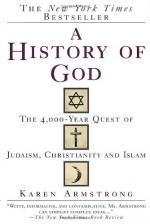
|
| Name: _________________________ | Period: ___________________ |
This test consists of 15 multiple choice questions and 5 short answer questions.
Multiple Choice Questions
1. What vision did Muhammad experience?
(a) A vision of God.
(b) A vision of Satan.
(c) A vision of Jesus.
(d) A vision of the Angel Gabriel.
2. A counter movement came into being when the Shiis declared ____________.
(a) God's presence on earth was embodied in some mysterious way by their Imams.
(b) God did not exist.
(c) God's presence on earth was in the form of a man named Jesus.
(d) War on the Faylasufs.
3. Whose preaching resulted in the belief that the newly emerging religion could and should be embraced by the Gentiles?
(a) St. Thomas Aquinas's.
(b) St. Simon's.
(c) St. Peter's.
(d) St. Paul's.
4. The Faylasufs developed an advanced notion of God different from ____________.
(a) That of the non-traditional Koran.
(b) That of the traditional Koran.
(c) That of the Jews.
(d) That of the Christians.
5. Why are theories and philosophies not designed to convince unbelievers?
(a) All people were atheists.
(b) There were, at that point in time, no people called agnostics.
(c) All people were Christians.
(d) There were, at that point in time, no people called atheists.
6. This competing philosophy formed the basis of the theology of __________.
(a) The Roman Catholic Church.
(b) The Mormon Church.
(c) The Lutheran Church.
(d) The Eastern Orthodox Church.
7. The concept of a Divine Trinity is largely the result of the teachings of ____________.
(a) John.
(b) Augustine.
(c) Paul.
(d) Jesus.
8. The application of their method to the Koran was also influenced by ____________ teachings.
(a) Jewish, Gnostic, and Hindu.
(b) Persian, Buddhist, and Hindu.
(c) Christian, Jewish, and Buddhist.
(d) Persian, Indian, and Gnostic.
9. What tribe was Muhammad a member of?
(a) Quraysh.
(b) Sunni.
(c) Mohecan.
(d) Blackhawk.
10. Where did the newly founded religion of Christianity spread quickly?
(a) In the middle east.
(b) Places in the Eastern Mediterranean where the Jews of the diaspora had settled.
(c) In Europe.
(d) In Spain.
11. They tried to show that al-Lah was compatible with ____________.
(a) Their rationalist's ideals.
(b) Their fundamentalist ideals.
(c) A personal God.
(d) Mysticism.
12. In 622 CE, accepting an invitation from the inhabitants of Yathrib, Muhammad and his followers migrated to ______.
(a) What is the modern city of Baghdad.
(b) What is the modern city of Jerusalem.
(c) What is the modern city of Medina to the north of Mecca.
(d) What is the modern city of Cairo.
13. Once "God" is presumed to exist as a separate external entity, humans can _____________.
(a) Externalize and worship their own prejudices and desires.
(b) Learn to be more loving and understanding.
(c) Be like God.
(d) Forget about God.
14. A similar intellectual movement developed among the Jews in the Islamic empire who did not accept the doctrine of ____________.
(a) The Neoplatonic.
(b) The Neopolitan.
(c) The Neoclassical.
(d) The Metropolitan.
15. Christianity was a religion of __________.
(a) Slaves and lower caste people.
(b) Europeans.
(c) Romans.
(d) The wealthy.
Short Answer Questions
1. During the twelfth century, European scholars had flocked to Spain to study ____________.
2. What happened almost immediately to the newly established Christian Church in the Roman Empire?
3. The Romans, initially regarded Christianity as _____________.
4. What was considered blasphemous by Jews and later by Muslims?
5. Muhammad came under the influence of __________, some of whom were well disposed towards him.
|
This section contains 543 words (approx. 2 pages at 300 words per page) |

|




